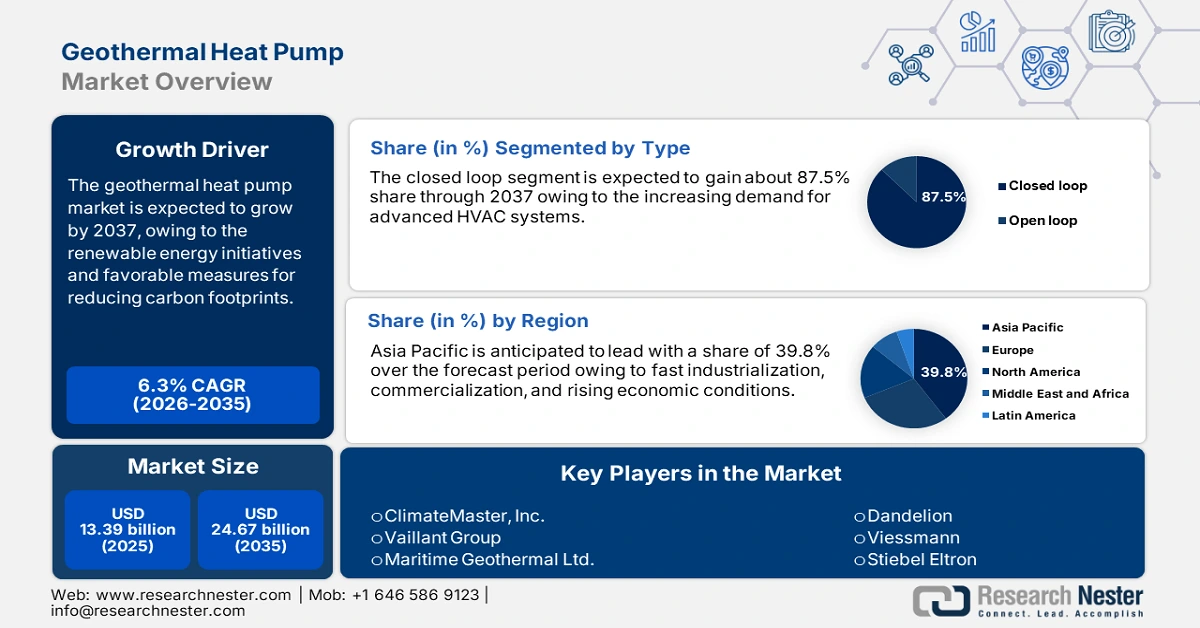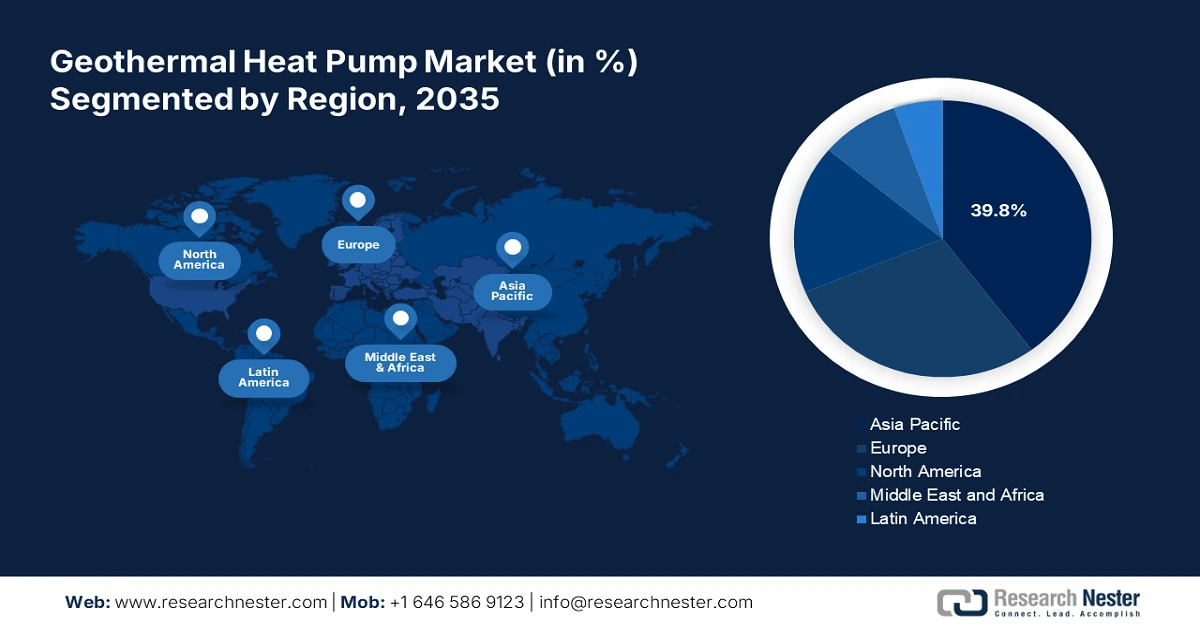Geothermal Heat Pump Market Outlook:
Geothermal Heat Pump Market size was over USD 13.39 billion in 2025 and is anticipated to cross USD 24.67 billion by 2035, growing at more than 6.3% CAGR during the forecast period i.e., between 2026-2035. In the year 2026, the industry size of geothermal heat pump is estimated at USD 14.15 billion.

The geothermal heat pump market is driven by increasing demand for efficient systems. With increasing energy costs concerns over climate change and government commands pushing for lesser carbon emissions, energy-efficient heating and cooling solutions have increased widespread attention. Governments across several regions have recognized the long-term energy-saving and environmental benefits of these systems and therefore announced tax credits, subsidies, and other incentives to encourage more adoption. By helping through decreasing the initial investment burden these incentives make geothermal systems financially viable for both commercial and residential users therefore boosting the market growth.
According to the U.S. Department of Energy and DSIRE data, the 30% federal Investment Tax Credit (ITC), when combined with available electrification rebates, can reduce household geothermal system costs by up to half—saving as much as USD 15,000 for higher-cost installations. For commercial properties such as schools and retail outlets, the ITC similarly offsets 30–50% of upfront expenses for geothermal heat pump adoption. Proper implementation of the new federal funding can help the geothermal market grow and decrease upfront costs even further.
Key Geothermal Heat Pump Market Insights Summary:
Regional Highlights:
- Asia Pacific commands a 39.80% share in the Geothermal Heat Pump Market, with industrialization and expansion beyond residential use driving its dominance and growth prospects by 2035.
- North America's Geothermal Heat Pump Market is expanding significantly by 2035, fueled by demand for sustainable heating and tech support.
Segment Insights:
- Closed-loop systems segment are expected to secure an 87.50% share by 2035, driven by the rising need for energy-efficient HVAC systems and emission reduction.
Key Growth Trends:
- Favorable measures for reducing carbon footprints
- Technological Developments
Major Challenges:
- Lack of awareness regarding geothermal heat pumps
- Dependence on skilled labor
- Key Players: ClimateMaster, Inc., Vaillant Group, Maritime Geothermal Ltd., Dandelion, Viessmann, Stiebel Eltron, and NIBE.
Global Geothermal Heat Pump Market Forecast and Regional Outlook:
Market Size & Growth Projections:
- 2025 Market Size: USD 13.39 billion
- 2026 Market Size: USD 14.15 billion
- Projected Market Size: USD 24.67 billion by 2035
- Growth Forecasts: 6.3% CAGR (2026-2035)
Key Regional Dynamics:
- Largest Region: Asia Pacific (39.8% Share by 2035)
- Fastest Growing Region: Asia Pacific
- Dominating Countries: China, United States, Japan, Germany, South Korea
- Emerging Countries: China, India, Brazil, Mexico, Turkey
Last updated on : 14 August, 2025
Geothermal Heat Pump Market Growth Drivers and Challenges:
Growth Drivers
- Favorable measures for reducing carbon footprints: Favorable measures to decrease carbon footprints are becoming a significant driver in the geothermal heat pump market as industries and countries globally prioritize sustainability measures. GHPs use renewable energy from the earth to offer heating and cooling while producing zero on-site carbon emissions. This makes them an attractive solution for reducing reliance on fossil fuels and meeting carbon decrease targets.
For example, in March 2023, Fraunhofer ISE announced the development of heat transfer systems, retrofit heat pumps, and ventilation systems in multi-family houses as part of the project - LowEx in the Building Stock. Also, the team had technologically advanced a multi-source heat pump with Viessmann Germany-based heating manufacturer. The device uses geothermal and air as heat sources. The multi-source heat pump system combines the benefits of the two heat sources on the ground and outside air. With this combination, a smaller drilling range is attained yet the high efficiency of a brine heat pump is still attainable. - Technological Developments: Technological developments such as enhanced heat exchange systems and efficient drilling techniques have made geothermal pumps easier and more effective to install which improves their market appeal. Developments have led to more reliable, efficient, and cost-effective systems while making GHPs an attractive choice for both commercial and residential applications. These developments include more efficient heat exchangers, enhanced ground loop designs, and improved system controls.
Technological development can be seen when in September 2024, Dandelion Energy, its innovative geothermal heat pump that is Dandelion Geo. It has the maximum heating efficiency of any heat pump in the market and also delivers heat at an unprecedented low cost. Companies are building codes and enacting energy efficiency regulations that encourage the usage of energy-efficient heating and cooling technologies. For example, in August 2020, Dandelion Energy announced its heating and cooling systems in Connecticut. Dandelion Home Geothermal System offers efficient air conditioning, heating, and warm water at substantial savings over older fossil fuel burning devices.
Challenges
- Lack of awareness regarding geothermal heat pumps: Many consumers remain unaware of GHP technology and its benefits. This lack of awareness is caused by limited education and marketing about low maintenance, long-term cost savings, and sustainability that is provided by geothermal heat pumps. As a result, businesses and consumers may be hesitant to adopt these systems frequently perceiving them as expensive upfront or too complex despite their potential for less operating cost over time.
Addressing this challenge needs education campaigns, bigger outreach, and a clear demonstration of the environmental and economic advantages of geothermal heat pumps to increase broader adoption. - Dependence on skilled labor: Unlike conventional heating and cooling systems, geothermal heat pumps comprise complex components such as ground loops which require particular drilling and careful installation to ensure longevity and efficiency. The specialized work requires skilled professionals who are trained in geothermal installation, system design, and maintenance. The availability of qualified technicians with specific expertise remains limited in many regions. This shortage can lead to longer installation times, higher labor costs, and even inappropriate installation that affects system performance.
Geothermal Heat Pump Market Size and Forecast:
| Report Attribute | Details |
|---|---|
|
Base Year |
2025 |
|
Forecast Period |
2026-2035 |
|
CAGR |
6.3% |
|
Base Year Market Size (2025) |
USD 13.39 billion |
|
Forecast Year Market Size (2035) |
USD 24.67 billion |
|
Regional Scope |
|
Geothermal Heat Pump Market Segmentation:
Type (Closed loop, Open loop)
In geothermal heat pump market, closed-loop segment is projected to hold revenue share of more than 87.5% by 2035 due to rising demand for advanced HVAC systems, growing awareness of environmental problems, and increasing need to reduce carbon emissions. Key factors that help in increasing geothermal heat pumps consist of low energy consumption, high efficiency, and low operating and maintenance costs. The closed-loop geothermal heat pump uses various loops of interconnected pipes hidden in the ground. A water or antifreeze solution flows uninterruptedly through the pipe. Geothermal heat is engrossed into the solution flowing in a closed loop.
Some businesses are focusing on plant integration to close the gap between the demand and supply of products with manufacturer incentive plans and several government-funded schemes. For example, in September 2021, Vermont announced a growth incentive for the ground source or geothermal heat pump market. Meanwhile, it's important to achieve decarbonization targets. These incentives encourage homeowners to use the product to decrease greenhouse gas emissions.
Application (Residential, Commercial, Industrial)
The residential application segment is expected to gain a significant share in the geothermal heat pump market through 2035 owing to rising demand for energy-efficient products that are made for cooling, space heating, and hot water generation applications in apartments and homes. Favorable government initiatives and tax rebates obtained on the installation of energy-saving products are anticipated to increase demand for GHP in the residential sector. Northern countries mainly use GHP for heating purposes due to their cold temperatures.
Installation of energy-saving products boosts the demand for geothermal heat pumps in the residential sector. For example, in March 2023, Viessmann announced a new range of geothermal heat pumps, Vitocal 222-G for residential space and water heating applications. The new series of heat pumps is available in the heating output ranging from 5.8 kW to 10.4 kW with a maximum flow of 65°C temperature. This advanced product launch helped the company to raise its product portfolio and improve its business revenue.
Our in-depth analysis of the geothermal heat pump market includes the following segments:
|
Type |
|
|
Application |
|

Vishnu Nair
Head - Global Business DevelopmentCustomize this report to your requirements — connect with our consultant for personalized insights and options.
Geothermal Heat Pump Market Regional Analysis:
Asia Pacific Market Analysis
Asia Pacific industry is estimated to hold largest revenue share of 39.8% by 2035, owing to rapid industrialization, commercialization, and rising economic conditions. A robust regional consumer base has led to an increase in the demand for geothermal heat pumps. Also, the major manufacturing sector with a dense population is anticipated to positively influence market growth. Moreover, the expansion of geothermal heat pumps beyond residential usage to industrial and commercial applications additionally sets Asia Pacific's position as an important player in the geothermal heat pumps market while contributing to sustainability goals and energy efficiency in the region.
Geothermal heat pumps are used by rapid urbanization in countries including China to offer effective heating and cooling in crowded settings. Technological advancements and government support have also led to market expansion. China is committing to reduce carbon emissions and improve energy efficiency. According to Heat Pumping Technologies, China is an industry leader in the heat pump for a green future. There is a “Double Carbon Policy” in China that aims for carbon neutrality by 2060. The worldwide deployment of heat pumps in China which was held in August 2024 at the Shanghai Heat Pump Forum (HPF) was brought by 1000 industry professionals globally.
India is committing to decrease greenhouse gas emissions which has led to the promotion of eco-friendly solutions with geothermal heat pumps. For instance, in January 2024, Havells announced its latest innovation of India’s first energy-efficient heat pump water heaters, to meet the demands of residential applications by cutting-edge technology offering up to 75% energy savings and setting new standards in water heating. The company specifically focuses on concerns related to energy wastage and the capability of hot water. The revolutionary Havells Heat Pump provides a solution that only consumes ¼energy cost compared to conventional water heaters.
North America Market Analysis
North America is projected to experience significant growth during the forecast period due to increasing requirements for water heating and space heating, as well as growing government initiatives and support is projected to boost the regional market growth. Moreover, developments in geothermal technology and increasing emphasis on sustainable building practices while promoting renewable energy technologies are further propelling the geothermal heat pump market to grow.
The growing demand for space heating equipment that is sustainable and eco-friendly when compared to substitutes including fossil fuel-based heating products particularly in the U.S. geothermal heat pump industry will complement the scenario. For example, in November 2022, Dandelion Energy funded USD 70 million in Series B1 to enhance and expand its geothermal heat pump operation across the U.S. The company has also tripled its commercial operation in 2022 supported by the Inflation Reduction Act by the U.S. government. This provides tax credits and some other financial incentives for house owners who are adopting geothermal technology. This strategy with financial support further enhances the transition of geothermal heat pumps in the U.S. market.
Additionally, the Canada geothermal market will grow due to the growing demand for high-quality infrastructure that provides a high standard of living in both commercial and residential sectors. All the parameters including favorable standards to encourage new zero-emission buildings will significantly boost the use of geothermal heat pumps across the nation. For instance, researchers at the Université du Québec have surveyed four Canadian cities to determine the economic feasibility of installing geothermal heating pumps in houses situated in Vancouver, Montreal, Halifax, and Toronto. Researchers found geothermal heat pumps most feasible in Halifax with less potential savings in the other cities.

Key Geothermal Heat Pump Market Players:
- ClimateMaster, Inc.
- Company Overview
- Business Strategy
- Key Product Offerings
- Financial Performance
- Key Performance Indicators
- Risk Analysis
- Recent Development
- Regional Presence
- SWOT Analysis
- Vaillant Group
- Maritime Geothermal Ltd.
- Dandelion
- Viessmann
- Stiebel Eltron
- NIBE
Companies such as Daikin Industries Ltd., ClimateMaster, Inc., and Mitsubishi Electric Corporation are some leading companies that have taken charge by advancing the technologies and expanding their product portfolios. Also, these companies are investing in research and development to enhance their product system. Some companies also collaborate by working together to achieve a common goal.
For instance, in February 2024, Subterra Renewables and Enercare Inc. introduced a fully integrated heating and cooling solution driven by renewable geothermal energy. This initiative's goal is to support consumers and Canadian developers in transitioning from fossil-fuel-powered systems to renewable geothermal energy. Here are some leading players in the geothermal heat pump market:
Recent Developments
- In October 2021, Carrier Global Corporation completed its acquisition of Nlyte Software successfully, Nlyte is a leader in data center infrastructure management (DCIM) software programming. Its proven data center expertise expands Carrier's HVAC business's access to the increased DCIM segment.
- In October 2020, Daikin Applied expanded its SmartSource Compact water source heat pump (WSHP) product line. These are configured for geothermal applications or boiler towers that are often found in offices, schools, lodging, condominiums, and retail facilities.
- Report ID: 6705
- Published Date: Aug 14, 2025
- Report Format: PDF, PPT
- Explore a preview of key market trends and insights
- Review sample data tables and segment breakdowns
- Experience the quality of our visual data representations
- Evaluate our report structure and research methodology
- Get a glimpse of competitive landscape analysis
- Understand how regional forecasts are presented
- Assess the depth of company profiling and benchmarking
- Preview how actionable insights can support your strategy
Explore real data and analysis
Frequently Asked Questions (FAQ)
Geothermal Heat Pump Market Report Scope
Free Sample includes current and historical market size, growth trends, regional charts & tables, company profiles, segment-wise forecasts, and more.
Connect with our Expert
Copyright @ 2026 Research Nester. All Rights Reserved.




